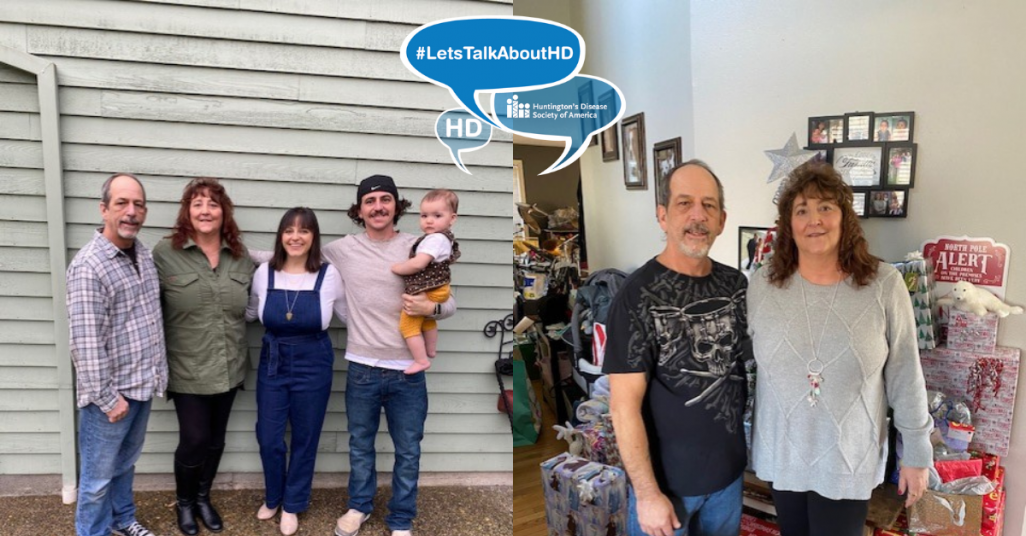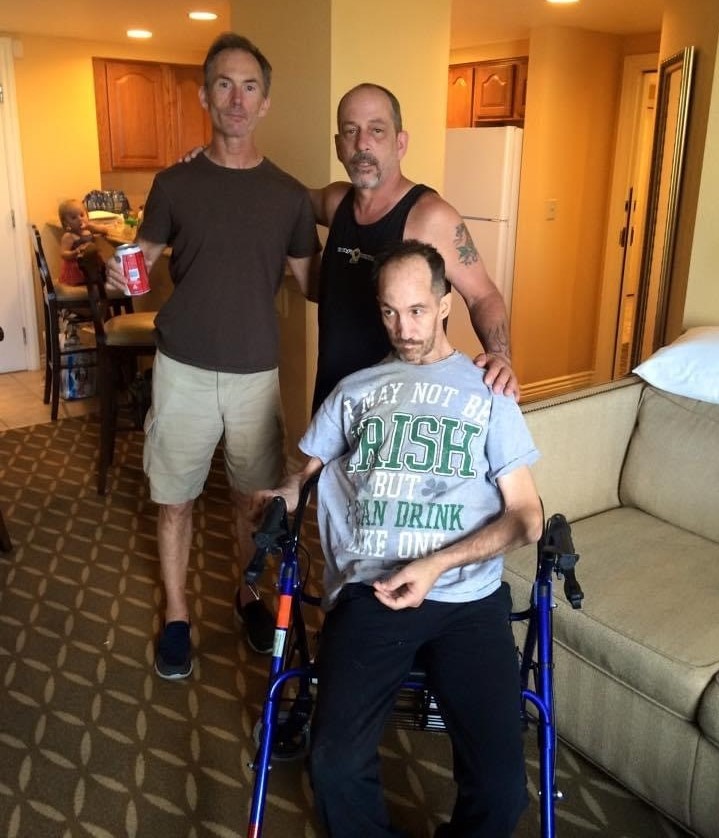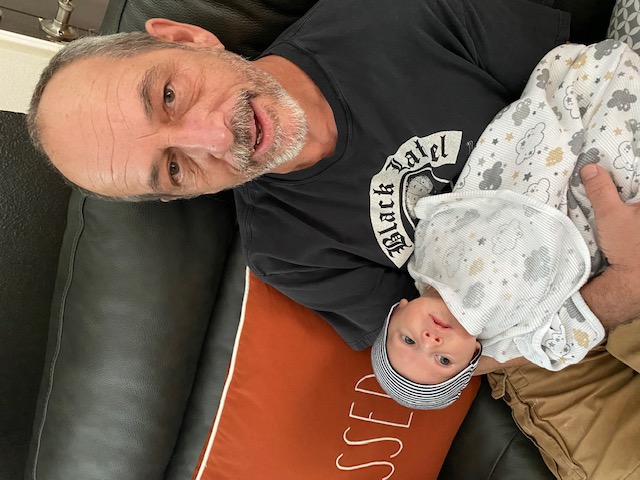
By Matthew Santamaria (msantamaria@hdsa.org)
NOTE: The following story discusses the topic of suicide. If you are feeling suicidal or have suicidal thoughts, visit the National Suicide Prevention Lifeline or call 1-800-273-8255.
In 1994, Oregon resident Kim Hay met her future husband, Roger. In 1998, the couple were married. Roger’s Huntington’s disease (HD) journey began before this.
HD is a fatal genetic disorder that causes the progressive breakdown of nerve cells in the brain. It deteriorates a person’s physical and mental abilities during their prime working years and has no cure.
Roger’s father served his country in the Army. As the years went on, his father started to develop personality changes and mood swings. It would become apparent that these symptoms were the result of HD.
The symptoms of HD are described as having ALS, Parkinson’s and Alzheimer’s – simultaneously. Symptoms include personality changes, mood swings, depression, forgetfulness, impaired judgment, unsteady gait, involuntary movements, slurred speech, difficulty in swallowing, and significant weight loss.
Roger is one of three brothers, including Mark and Jim. Every child of a parent with HD has a 50/50 chance of inheriting the faulty gene.

One day, Roger’s father had his driver’s license taken away due to HD related symptoms. The next day, he committed suicide and Mark was present. Mark would later develop symptoms of HD as he struggled with drug use. He would also pass away.
In 2005, Roger started to develop HD related symptoms including ticks, involuntary movements, and angry moods. Kim would convince Roger to get tested for HD.
The decision to get genetically tested is difficult to make. Each year, 5-10% are tested. It is never the right or wrong decision to be tested. There are people that see no benefit in knowing that they will develop the disease while others want to know in order to make informed choices about their future. It can take up to several weeks to receive your results from the genetic testing center.
In July of 2006, Roger tested positive for HD. He has a son from a previous marriage at risk but Kim’s two children are not at risk.

After the diagnosis, Kim would truly realize the meaning of friends in your life. She had friends that she would not see a lot anymore and others she would grow closer to.
Kim wants to raise more awareness in the Portland community to show that nobody is alone in the fight against HD.
###
Huntington’s disease (HD) is a fatal genetic disorder that causes the progressive breakdown of nerve cells in the brain. It deteriorates a person’s physical and mental abilities during their prime working years and has no cure. Every child of a parent with HD has a 50/50 chance of inheriting the faulty gene. Today, there are approximately 41,000 symptomatic Americans and more than 200,000 at-risk of inheriting the disease. The symptoms of HD are described as having ALS, Parkinson’s and Alzheimer’s – simultaneously.
The Huntington’s Disease Society of America is the premier nonprofit organization dedicated to improving the lives of everyone affected by HD. From community services and education to advocacy and research, HDSA is the world’s leader in providing help for today and hope for tomorrow for people with HD and their families.
HDSA was founded in 1967 by Marjorie Guthrie, the wife of legendary folk singer Woody Guthrie. Woody died from HD complications when he was only 55 years old, but the Guthrie family legacy lives on at HDSA to this day.
To learn more about Huntington’s disease and the work of the Huntington’s Disease Society of America, visit www.HDSA.org or call 1(800)345-HDSA.
This is a story featuring a personal experience with Huntington’s disease. If you would like to have your story told please contact Matthew Santamaria at msantamaria@hdsa.org
NOTE: The following story discusses the topic of suicide. If you are feeling suicidal or have suicidal thoughts, visit the National Suicide Prevention Lifeline or call 1-800-273-8255.
In 1994, Oregon resident Kim Hay met her future husband, Roger. In 1998, the couple were married. Roger’s Huntington’s disease (HD) journey began before this.
HD is a fatal genetic disorder that causes the progressive breakdown of nerve cells in the brain. It deteriorates a person’s physical and mental abilities during their prime working years and has no cure.
Roger’s father served his country in the Army. As the years went on, his father started to develop personality changes and mood swings. It would become apparent that these symptoms were the result of HD.
The symptoms of HD are described as having ALS, Parkinson’s and Alzheimer’s – simultaneously. Symptoms include personality changes, mood swings, depression, forgetfulness, impaired judgment, unsteady gait, involuntary movements, slurred speech, difficulty in swallowing, and significant weight loss.
Roger is one of three brothers, including Mark and Jim. Every child of a parent with HD has a 50/50 chance of inheriting the faulty gene.

One day, Roger’s father had his driver’s license taken away due to HD related symptoms. The next day, he committed suicide and Mark was present. Mark would later develop symptoms of HD as he struggled with drug use. He would also pass away.
In 2005, Roger started to develop HD related symptoms including ticks, involuntary movements, and angry moods. Kim would convince Roger to get tested for HD.
The decision to get genetically tested is difficult to make. Each year, 5-10% are tested. It is never the right or wrong decision to be tested. There are people that see no benefit in knowing that they will develop the disease while others want to know in order to make informed choices about their future. It can take up to several weeks to receive your results from the genetic testing center.
In July of 2006, Roger tested positive for HD. He has a son from a previous marriage at risk but Kim’s two children are not at risk.

After the diagnosis, Kim would truly realize the meaning of friends in your life. She had friends that she would not see a lot anymore and others she would grow closer to.
Kim wants to raise more awareness in the Portland community to show that nobody is alone in the fight against HD.
“Don’t give up. We need to keep fighting especially for the Juvenile Onset HD Community and to continue to get the message out there."
###
Huntington’s disease (HD) is a fatal genetic disorder that causes the progressive breakdown of nerve cells in the brain. It deteriorates a person’s physical and mental abilities during their prime working years and has no cure. Every child of a parent with HD has a 50/50 chance of inheriting the faulty gene. Today, there are approximately 41,000 symptomatic Americans and more than 200,000 at-risk of inheriting the disease. The symptoms of HD are described as having ALS, Parkinson’s and Alzheimer’s – simultaneously.
The Huntington’s Disease Society of America is the premier nonprofit organization dedicated to improving the lives of everyone affected by HD. From community services and education to advocacy and research, HDSA is the world’s leader in providing help for today and hope for tomorrow for people with HD and their families.
HDSA was founded in 1967 by Marjorie Guthrie, the wife of legendary folk singer Woody Guthrie. Woody died from HD complications when he was only 55 years old, but the Guthrie family legacy lives on at HDSA to this day.
To learn more about Huntington’s disease and the work of the Huntington’s Disease Society of America, visit www.HDSA.org or call 1(800)345-HDSA.
This is a story featuring a personal experience with Huntington’s disease. If you would like to have your story told please contact Matthew Santamaria at msantamaria@hdsa.org
